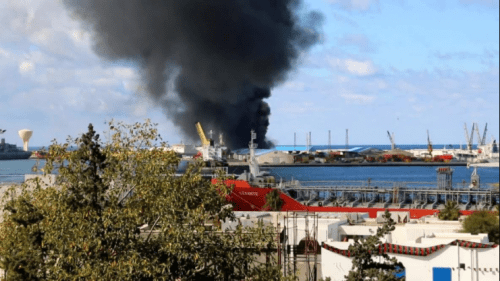Eastern Libyan forces said they attacked the seaport of Libya’s capital on Tuesday to target a weapons depot, signaling a new escalation in the battle for control of Tripoli.
The Libya National Army (LNA) faction, which is based in the east of the sprawling country and commanded by Khalifa Haftar, did not elaborate about the arms depot it cited in a statement.
The LNA had earlier said, also without giving details, that it had targeted a Turkish ship which had been delivering arms to the internationally recognized government based in the capital, located in Libya’s northwest.
Tripoli port is a major gateway for food, fuel, wheat and other imports for the capital area, engulfed in war since the LNA began a campaign in April 2019 to take the city, where the U.N.-backed government is backed by Turkey.
All ships including fuel tankers were moved out of the port after Tuesday’s attack, two port officials said. Tripoli-based forces said the LNA had fired four missiles.
Since January, Turkey has sent several ships carrying arms and heavy trucks to Tripoli and Misrata, another western port, diplomats say.
The LNA is allied to a parallel government in eastern Libya supported by the United Arab Emirates, Egypt, Jordan and Russian mercenaries. Eastern ports and airports are out of range of the Tripoli forces.
Oil-rich Libya has been riven by factional warfare and disorder since rebels toppled dictator Muammar Gaddafi in 2011.
Tuesday’s attack on the port unfolded as officers from the Tripoli forces and the LNA held a second round of indirect talks in Geneva to establish a permanent ceasefire. Both sides refused again to sit in the same room, U.N. Libya envoy Ghassan Salame said, though he said he was hopeful of making progress.
“So while the situation on the ground remains a situation where the truce is very fragile…, nobody has so far reneged on the principle of accepting the truce and the political process is trying to find a way to move forward,” he told reporters.
But, in a statement, an official in the Tripoli-based Government of National Accord (GNA) cast doubt on whether Haftar was willing to negotiate.
“The people, towns, cities and civilian infrastructure of Libya continue to be attacked by Haftar, along with the UAE, Egypt, Jordan and Russia,” said Mohamed Ali Abdallah, a GNA advisor. “Despite what we wanted, there is no ceasefire and he’s no partner for peace. We need real, serious action now.”
Salame also said a ceasefire was not a precondition for advancing on other matters such as how to better distribute state revenues generated by oil.
“It (talks) are going pretty well on the economic side, but it is harder on the military side,” he said.
He added that he had received conditions from tribesmen allied to eastern forces to lift a blockade of eastern oil export ports, but said these were quite general and would have to be fleshed out in more U.N.-led talks in Geneva next week.

